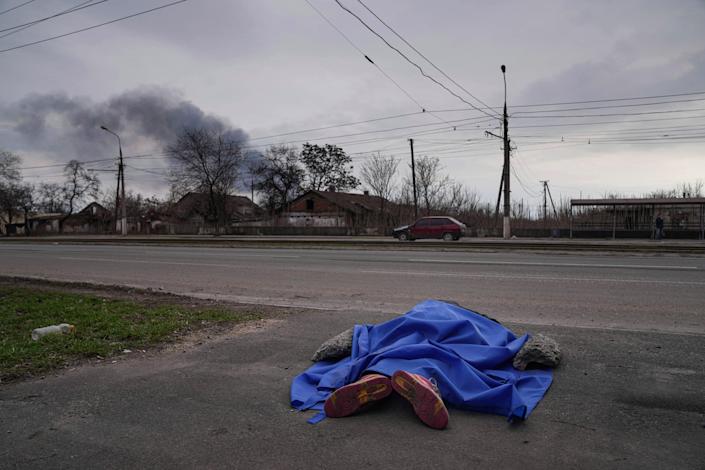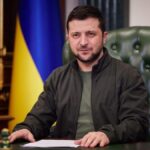The author of this article, Erica Glenn, is a current Fulbright Scholar who was scheduled to conduct research in Ukraine this spring. Due to the war, she has been reassigned to Poland.
After posting about the war on Facebook on March 2, my friend Anya went silent. So did her entire city, Mariupol, a place I had once called home.
Blockaded by Putin’s army with no electricity, no heat (in the dead of winter), no cell service, and rapidly dwindling supplies of food and water, residents could only pray for an escape route that never seemed to materialize. The army blocked humanitarian convoys. Bodies piled high by the thousands. Some were laid to rest in mass graves.
As shelling intensified and starvation set in, the streets became strewn with bodies. We feared Anya, a young woman about my age, might be among them. The silence was unbearable. Then, on Tuesday, Anya broke that silence. I received a series of tearful voice messages:
“Dear Erica, I managed to leave Mariupol with my sister and her children yesterday. It was difficult; we waited for three hours in a traffic jam amidst explosions. We were so frightened that our car would be hit, but we managed to escape to Berdyansk. It’s now 6 a.m., and we are continuing further. But I’ve been crying all the way because we couldn’t bring my whole family.”
Map and track Ukraine invasion: See where Russian forces are moving
Anya escaped with her sister and nieces, but their mother and her sister’s husband are still trapped in Mariupol. So are an estimated 300,000 civilians, including more than 50 friends and family members who I am trying to account for, with the help of Vlad, a former Mariupol resident whose mother is stuck in the city. (Anya and Vlad are being identified by their first names only to protect their friends and family members who remain in Mariupol.)
Vlad worked with me from his building in Kyiv, disappearing into an underground shelter every couple of hours when air strikes began. Then he would resurface, and we’d continue. At one point, Vlad went silent for seven hours, and I assumed the worst. He is now in a shelter so crowded he cannot even lie on the floor to sleep. “We let the women and children sit,” he said. “The rest of us have to stand. I am so tired. My head is pounding.”
Vlad has been remarkably resilient, but that resilience is starting to break down.
Invaders plunge city into darkness
Contacting people inside Mariupol feels hopeless. Without electricity, no one can charge their phones. The people are being systematically starved to death in what feels like a calculated genocide.
We finally heard from one woman who has been dodging shelling once a day to reach a spot in the city with internet access. She checks her messages, makes as many brief calls as possible, and then shuts off her phone to conserve the battery. Although Anya was staying at her home, this woman did not leave Mariupol when Anya did – perhaps because she knew she was the only hope of outside contact for friends and family in the city. We haven’t heard from her since Wednesday.
Ukraine war diary: I grew up in Russia. Now I fight in Kyiv for Ukraine
Through tears, Anya called this woman her hero and emphasized that to venture into the streets of Mariupol is suicide. “I don’t mean to frighten you,” she said, “but when you walk outside, you see bodies lying everywhere. It’s horrific.”


People are running out of food and water. A church leader who Anya knows has been traveling from house to house to ensure that families have enough to eat. A group of boys have been delivering water to the central area of Mariupol (outlying areas aren’t so lucky). But ever since the bombing of the Drama Theater at the center of town, these boys haven’t returned. (The word “children” was written in large Russian letters on both sides of the Drama Theater, and still the building was destroyed.)
Putin must pay for this crime: A pregnant woman and her unborn baby pulled from hospital rubble have died
Anya wonders if her friend’s home where the rest of her family is staying has been hit in the attacks. Vlad isn’t sure whether his mother survived.


Other friends fear for family members who live on the left bank of Mariupol, where water supply is scarce and buildings are vulnerable to attacks from the sea. People nearer the city center haven’t heard from left bank family members since the city went dark. (Reaching those areas would take more than two hours on foot.)
Hear the horrid echoes of history
Anya thinks the Ukrainian army probably has enough supplies to withstand the Russian onslaught in Mariupol for another month. But the population of Mariupol will not survive that long.
The humanitarian corridor through which Anya escaped opened just a couple of days ago and is an option only for those with private cars and access to gasoline. Many cars have been shelled, and there is no more gasoline in the city, she said.


Anya wept as she pleaded: “Please help us. This is so important. I pray that everything will be OK and that my family and I can be together again.”
Zelenskyy’s bold challenge to Biden: Can America be the leader for peace?
We can’t look away from the reality of these horrors. We must heed the pleas of Mariupol’s besieged population before it is too late. This is the same area of the world where the we saw the Holodomor (Stalin’s forced starvation of millions of Ukrainians) from 1932 to 1933 and, just a few years later, the terror of the Holocaust.
When history repeats itself, shouldn’t we do all we can to end up on the right side?


Erica Glenn, DMA, is a current Fulbright Scholar who was scheduled to conduct research in Ukraine in spring 2022. Due to the war, she has been reassigned to Poland. Glenn has lived in Ukraine for extended periods of time since 2008 and speaks Ukrainian, Russian and Polish. She is a visiting professor at Brigham Young University-Hawaii.
You can read diverse opinions from our Board of Contributors and other writers on the Opinion front page, on Twitter @usatodayopinion and in our daily Opinion newsletter. To respond to a column, submit a comment to letters@usatoday.com.
This article originally appeared on USA TODAY: Voices from Mariupol, Ukraine, where 300,000 civilians are under siege




